#also I just found out that bbc ghosts is called Ghosts UK here in the united states and i was like??? ew
Explore tagged Tumblr posts
Text
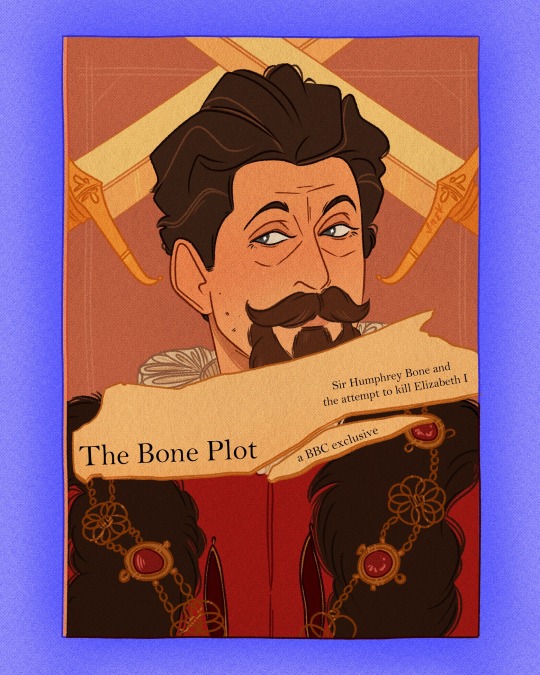
the bone plot if it was a bestselling book at your local Waterstones
#bbc ghosts#this made me go AUGHHHH once i added the text lmao#sir humphrey bone#humphrey bone#bbc ghosts fanart#larry rickard#laurence rickard#art#illustration#digital art#artists on tumblr#the bone plot#csp#clip studio paint#also I just found out that bbc ghosts is called Ghosts UK here in the united states and i was like??? ew#not in my house#also i love sir humphrey
718 notes
·
View notes
Text
The Soundtrack of Being Human: The Fan Favourite Musical Moment!
It's time! The results are in! A couple of weeks ago I launched a vote for fans of the BBC's cult hit Being Human to choose their favourite use of (non-score) music that appeared over its five series. And it seems only right that the results should be posted on the anniversary of the first episode airing (25th January 2009). Thank you to everyone who voted and shared their thoughts! I hope you all enjoyed remembering all the fantastic tracks that were used in such fantastic scenes.
The fandom is a little like a ghost; some people think it's dead and gone, and most of the time it may be hardly noticeable but oh no! It's for sure alive in spirit, and just like Gilbert, it has a lot to say about music!
First though a massive thank you to the amazing directors, editors, producers, music supervisors, and anyone else from the show's crew who was behind the soundtrack. They won't see this, but Being Human would not have been Being Human without its music, and it was a super hard decision trying to narrow it down from over 100 possible choices!
But there can be only one winner. So, here is a countdown of the top ten musical moments as voted for... BY YOU!
Keep reading below though if you want a little bit more blabbering on about the music - including comments from you guys! (or you just want to know the results quicker!).
(Before I get into it though, please remember this is all just a bit of fun and should not be taken (too!) seriously!)
#10/9. Dirge by Death in Vegas - 'Uncle Billy' shows Nina the Box Tunnel Massacre scrapbook
The Longest Day (S3).
Starting off our countdown is the music that heralds the beginning of the end for our favourite greasy-haired vamp. Playing for a lengthy 5 minutes (almost the whole song!), it's probably the longest musical moment in the whole show. Accompanying Herrick showing Nina the scrapbook, Nina freaking out, her making THAT phone call, then finishing as Herrick utters some surprisingly-ominous final words, it's no wonder this reached the top 10. It's beautifully haunting and impactful, and you realise that Mitchell is really and truly screwed.
#10/9. Can't Pretend by Tom Odell - The Trio walk through the deserted city
The Last Broadcast (S5).
The one song from Series 5 that made the top 10, it follows Hal, Alex and Tom as they discover that shit has indeed got real in the streets of Cardiff. One voter commented "The haunting vocals really add to the desolation of the scene, and the lyrics represent Alex and Hal's rocky relationship." Can't Pretend had only been officially released the week before it appeared in Being Human's final ever episode and Tom Odell was making a pretty big name for himself in the UK indie scene, so whoever managed to bag the licence - thank you!
#8. The Future's So Bright, I Gotta Wear Shades by Timbuk 3 - Cutler makes his entrance
Eve of the War (S4).
Series 4 fan-favourite Cutler swaggered onto our screens to this fun and upbeat song that has also become a firm favourite amongst us fans! Being Human always found music that fit characters perfectly, and this one is completely suited to the ambitious and optimistic (and maybe slightly foolish) visionary that is Cutler, Nick Cutler. Although nothing much happens in the scene, it was a pleasant distraction from the gloom and doom of the rest of the episode and immediately drew our attention to this trouble-making vampire.
#7 Somebody to Love by Jefferson Airplane - Time Travel Make Out Montage
Through the Looking Glass (S2).
With all of its songs reaching the top 20 of the vote, Through the Looking Glass is one of the stand-out episodes for musical moments as it transports us to the 1960s. This track plays as Mitchell gets it off with Josie in 1969, and Lucy back in the present day, in a scene that (despite Mitchell's stunning 60s hair) is as hot as you'd hope. The scene flicks back and forth with help from some fabulous editing but it's the music that really makes it, and "is one of the cleverest and most subtly heart-breaking things Being Human ever did."
#6. Tainted Love by Soft Cell - Annie meets Gilbert at the club
Ghost Town (S1).
"I hate this music!" Well, Being Human fans disagree with you hugely there, Annie! A good few voters praised Ghost Town as being their favourite ep for music, thanks to new wave fiend Gilbert who, as director Alex Pillai notes "is stuck in time [and] on the tunes of era in which he died." Tainted Love is blasting in the club when Annie first meets Gilbert and while it may not seem at first like a top musical moment, it's infinitely more significant when you realise how it introduces an episode full to the brim with relationship troubles...
#5. History Repeating by Propellerheads Feat. Miss Shirley Bassey - Herrick awakens after a jolly good munch
Though the Heavens Fall (S3).
The penultimate episode of S3 was anything but a happy ol' time, but it IS the episode with the most highly rated musical moments (Hungry Like the Wolf JUST missed out on the top 10). We all knew Herrick returning to his old self was inevitable, but it was still a brilliantly satisfying result and made all the more memorable by this song welcoming him back with all his memories and vampiric nature in full force. Having just mercilessly killed two people, history did indeed seem keen on repeating... Poor Nina never stood a chance.
#4. The Tunnel of Love by Fun Boy Three - Gilbert Fun!
Ghost Town (S1).
First introduced as a cynical and miserable counterpart to the slightly naive and chirpy Annie, Gilbert was revealed to be a truly caring and genuine man with a very certain idea of entertainment. And thus we were treated to the montage to end all montages - Gilbert Fun! Although Annie wasn't impressed with twig-dancing, police-insulting and Nietzsche-reading, we certainly were and Gilbert won our hearts. He also won the favourite supporting character tournament over on the Facebook group (but don't tell him that!).
#3. God's Gonna Cut You Down by Detroit Social Club - Mitchell returns to find Honolulu Heights has some guests staying
Though the Heavens Fall (S3).
Another song from the episode in which pretty much everything Goes Wrong (apart from the music!), God's Gonna Cut You Down is a pretty perfect choice to play as moody Mitchell comes home to discover it's standing room only for bloody lycos. A fan notes that "it just captures the rage and darkness around Mitchell, and it feels proper biblical." Safe to say that with the threat of the prophecy hanging over him, he's not feeling too good about the number of werewolves congregating downstairs. On a full moon. Great.
#2. Sigh No More by Mumford and Sons - Mitchell helps Carl fake his suicide and escape
Serve God, Love Me and Mend (S2).
The only song in the top 5 that isn't from an episode renowned for its musical moments, Sigh No More still managed to impact fans enough that it's reached 2nd place. The shot of Carl crying over his dead boyfriend with the lyrics saying "I'm sorry" in the background is a hugely powerful and emotional moment. At 2 minutes it's a long cue but it's an essential one - creating a segment that has at least one voter sobbing each time! Apparently it's one of music supervisor Ross Sellwood's favourite music uses too. Now I'm off to find tissues.
Before we get to first place, here's some honourable mentions.
St. Petersburg by Supergrass - the first song we hear on the show. Playing over the title card in the first two episodes, it's got a place in the hearts of fans and reached no.18 in the vote.
The Coral - The most used artist in the show with 3 songs appearing in the episode 'Tully', The Coral's songs just perfectly encapsulate Being Human's tone, especially in S1!
Grounds for Divorce by Elbow (S4 ep3)- This is for Sarah who was very upset that this wasn't included. I'm sorry, it is a great track.
Barbie Girl by Aqua (S1 ep4)- Being Human has a wonderful sense of humour, and this playing during Annie's poltergeist meltdown is a perfect example of that.
Blue Peter Theme (S4 ep6) - See above. You've just killed a vampire, and you gotta celebrate! Short but sweet and perfect for a show that represents the best of British TV.
All of Hal 'I Dont Sing' Yorke's delights - Not technically musical moments as classed here, but Hal wouldn't be Hal without his penchant for singing... despite his reluctance to admit it.
But that's not all! Fans were also asked to vote for their favourite Trailer Music and the vast majority voted for one in particular, and that is...
***** Howl by Florence + The Machine - Series 2 Trailers! *****
Awoo!!
But now back to the show! And at number 1... the fan favourite musical moment is...
#1. When the Sun Goes Down by Arctic Monkeys - George tries to find a place to transform
Flotsam and Jetsam (S1).
Playing as George runs (and screams) through the woods while trying to find a place to transform, When the Sun Goes Down has stood the test of time and has been voted the fan-favourite musical moment in the show. The song "sums up Georges predicament perfectly without being all wolfy and on the nose about it" and helps make George's nightmare situation one of the funniest and most memorable scenes in the whole show. Appearing in the very first half hour of the very first episode, it was the ultimate introduction to the Being Human we know and love - and made fans fall in love with George quicker than you can say "You smell like Polos, have you got a hole?" Ross Sellwood was the man behind this idea, and we are eternally grateful for it!
Thank you to everyone who voted, and to everyone who has kept the magic of this show alive for 13 years, and counting!
#being human bbc#being human uk#john mitchell#george sands#annie sawyer#hal yorke#tom mcnair#alex millar
77 notes
·
View notes
Text
Thornwood Manor: A Travelogue, pt. 1
With our trip to the UK postponed for the second year running, my parents asked if I wanted a ‘place holder’ trip. Pretty sure they were thinking Disney Land or something like that, but I went closer to home - and decidedly more British - and chose two nights stay at Thornwood Castle in Lakewood, Washington.

Actually a manor house rather than a castle, and probably a smallish manor house as far as these things go, Thornwood is still a worthy piece of architecture, a lovely place to spend the night, very photogenic, and a popular wedding venue. There was a wedding going on when we arrived and another the second day of our stay. It’s also been used as a filming site a time or two, the most recent - and famous - being Stephen King’s “Rose Red.” There were copies of the DVD liberally lying around in rooms and a poster in the upstairs ‘Movie Room’.
I stayed in Anna’s Suite, located on the second floor in the north corner (upper right in the above picture, right next to the balcony) and my parents took the Grand View right across the hall. They got the full kitchen, dining area, and balcony access.
I got the soaker tub with air jets.

Yes I took a bath. Then I got out, drained the water, and immediately found the button for the air jets. So I took another the next day. This was one of the three very modern features of the room. The others are the kitchenette with refrigerator, microwave, and Keurig machine; the portable air conditioner, there for the season; and the big screen TV, tactfully hidden in the wardrobe.
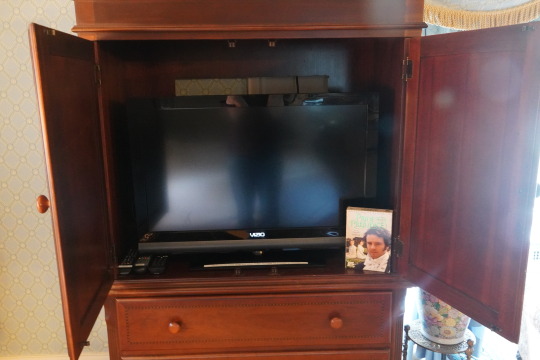
I got the BBC miniseries of “Pride and Prejudice” as my complimentary, “here’s one you don’t have to fetch down from upstairs’ movie. My parents got - you guessed it - “Rose Red.” I didn’t watch it, but felt I got the more appropriate of the two options.
Anna’s Suite, along with being an amusing choice for Downton Abbey lovers just for the name, was the room of the original lady of the house. It is currently the honeymoon suite and home to one of the manor’s many ghosts. It is one of the few actual rooms that is considered haunted, specifically.
I didn’t see any ghosts, but one made off with one of my coat hangers. Then it brought me a different coat hanger which was, admittedly, much nicer than the one it took, and that I felt compelled to leave there because, well, it wasn’t mine. Goofy ghosts.
I really should have written about that in the guest book.
The room itself is lovely! Light blues and creams with matching curtains and wallpaper, a great view of the front drive and the garden, and furniture that’s so pretty you almost don’t dare sit on it.
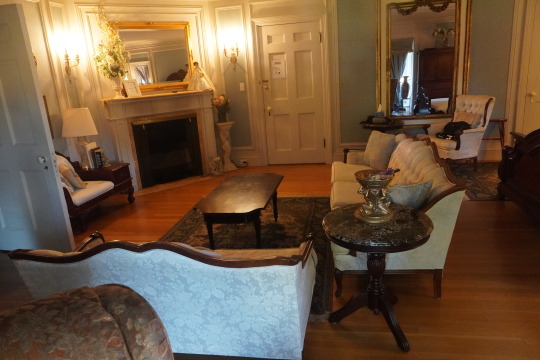
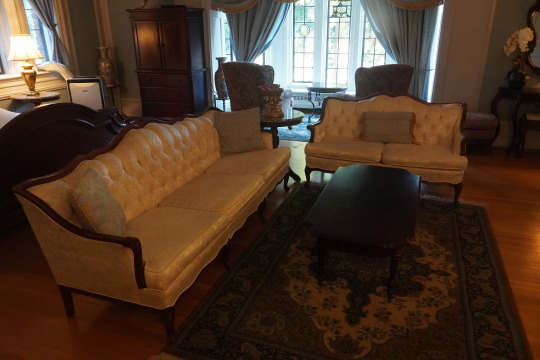

The only part I really could have done without was the doll of Jackie O. sitting on the mantle of the fireplace.

I mean, don’t get me wrong, it’s a nice enough doll, but. Um. If I actually was there with my newly-wed wife, I would have carefully relocated her to the walk-in closet/dressing area/water closet for the duration of the post nuptial celebration.
The rest of the manor did a splendid job of living up to expectation. It had a large, open, dark great hall with lots of lovely windows.

It had a winding stair case with another lovely window on the landing, complete with large, expensive, vintage looking objects d’art.
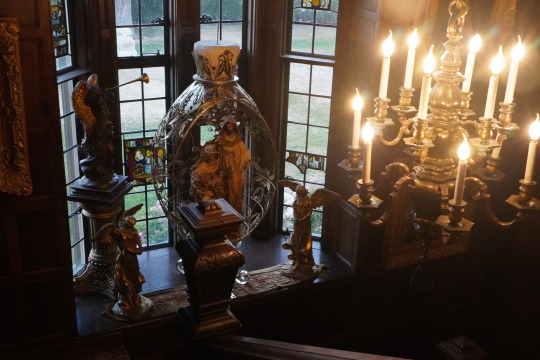
It, of course, had a library. The reading selection was widely varied and, to my amusement, colour coded.

And, upstairs, the a fore mentioned movie room where you could get movies to take down to your room, sit and watch them there, and, of course, enjoy the vintage movie posters......

...the vintage being 2002. Actually, there were posters for a 1923 silent film called “Eyes of the Totem” that had recently been rediscovered and they had posters of that too, but they weren’t nearly as prominent.
Upstairs there’s also a game room with pool, ping pong, foos ball, a bingo cage, and a few antique toys of low-level creepiness.
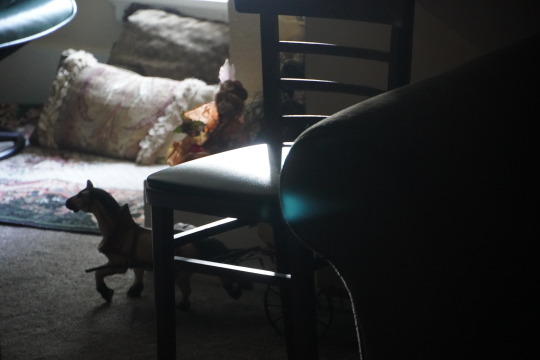
You can’t tell from here, but the dolls have neither glass eyes or carefully sculpted teeth....thank God. ...that and I think they’re paper mache rather than porcelain.
Then there’s the hall of mirrors, leading the way to the Casablanca room, which is just cool.
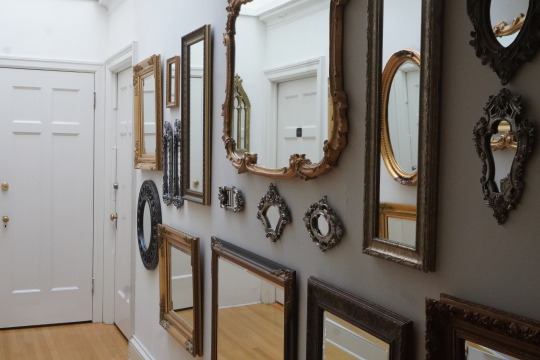
Outside measures up just as nicely, with a couple of surprises tossed in. There is, of course, a fountain in the middle of the drive. You could get a great shot of it from my room, so I took pictures of it in every available lighting. I will not post them all here, I promise.
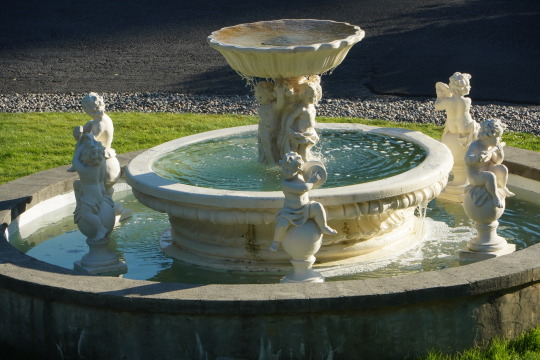
The door is guarded by lions, as it should be.
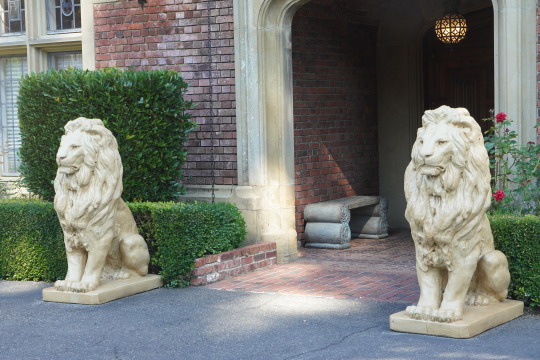
And here I seem to have run out of room.
To be continued.
#thornwood manor#travelogue#holiday#vacation#manor house#lots of picture#lakewood#old building#historic building#stephen king#rose red miniseries#thornwood castle
5 notes
·
View notes
Text
It’s week three of my Global-Pandemic-Induced decision to rewatch all of Supernatural, and so I’m still attempting to make this watch more productive than the last show that I binged.
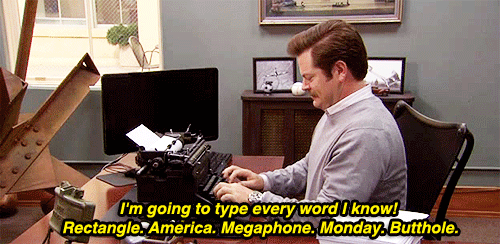
So I’m on disc two now - that’s episodes 5 - 8 for those of you watching on Netflix. By the time we get to this disc, we know the basic formula for Supernatural as a series - Two Hunks + Fighting Evil to the Power of Acceptable Levels of Gore x Missing Dad = Ratings Gold. Or at the very least, good enough ratings that we’ll give you a season (or fourteen). And then...well...then.
Episode five is “Bloody Mary”, easily the scariest episode of this first season and, based on the nose dive that the formula takes after season 1, probably the entire series. Maybe it’s that the Bloody Mary legend was one that really got me as a kid, maybe it’s just that I don’t do so hot with ghosts, but guys this episode still made me turn on all the lights and avoid all my mirrors. I accidentally turned this episode on at 9pm and regretted it immediately. I walked away at one point to go clean my kitchen to strategically miss some of the spookier points and I walked back in during an even spookier point. I was mad that there were no commercials at the commercial break cut-to-black! The first time I watched this episode, I’m pretty sure I watched it through my fingers. This most recent viewing, I ALSO watched it through my fingers. Guys, THIS EPISODE.

I will say it a-hecking-gain: This episode scared the SHIT out of me.
AND THEN, THEN! Then this show has the gall to go ahead and drop a major season/character plot point right there in the middle of all this content that I am actively trying not to look at: SURPRISE! Sam has premonition powers and sorta kinda knew that his girlfriend was gonna die a terrible death weeks before she dies. Because sure, why not?
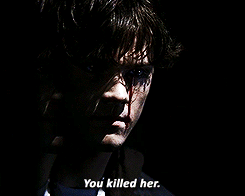
Ohmiglob the DRAMA.
I’m gonna take a moment to say that, yes, technically this piece of plot gets dropped within our first six episodes, so we can still safely say that, you know, they’re still setting up the story for the rest of the series. It’s not like a sudden twist they drop half way through the season, it’s being laid down as ground work. And I know that this turns out to be a MAJOR issue for the next four seasons at least, but can I just say: Kripke, you’re really throwing a lot at us. I mean, OK. here’s what we’ve got -
The Winchester’s lost their mom at a young age to some evil thing. Cool, got it.
THEN they have daddy issues with C-minus Single Dad John Winchester. Alright, that seems logical.
The brothers hunt bad guys looking for the thing that killed their mom. Ok still on board.
There’s family drama, relatable.
Dad’s gone missing and we gotta find, ok ok ok.
Also Sam’s girlfriend dies in a fire, alright, so we’re looking for that thing now too.
OH! And now Sam has magic powers.
I mean, it’s a lot, right? We got a lot of layers here. That’s all I’m sayin.
So “Bloody Mary”, right? Big episode, big bad guy, they kinda loophole their way into defeating her but I’m not mad. Big reveal at the end, so kind of an important lore episode. And then...well...then we get the following episodes:
“Skinwalker” - gross-out fx, establishes Dean as a lonely asshole with a lot of APB’s out on him
“The Hook Man” - takes the Urban Legend angle of the show and dials it up to 11
“Bugs” - Does what it says on the tin.
Now to be fair: all three of these episodes have at least ONE shining moment that reveals a little more about the characters we’re working with, and that character development plays out in important ways in the rest of the season/series. But all three of them are arguably---
FILLER EPISODES-ODES-ODES-ODESSssssssss.
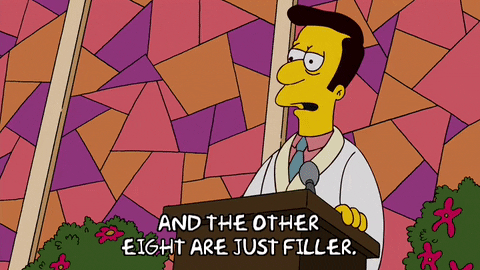
Alright, maybe that’s unkind. Maybe we should call them standalones or self-contained. A Filler is an episode designed to “fill out” your season. It doesn’t necessarily move the overarching story of the season forward, although it may contain some concepts or revelations that are important later. I’d argue that Supernatural has only ever had two kinds of episodes - Series Arc and Filler. Not that that’s a bad thing - I like a filler episode now and again. Depending on how heavy your season gets (and by all accounts Supernatural gets pretty heavy), they can be a nice breath of fresh air - also known as a Breather Episode. Or they can be just for fun. I’mma reference “Once More with Feeling” again because sure, why not throw in a musical episode in season 6 of a show about vampire slaying, that’s fine. I wanna reference something from Community here too, but honestly anything after season 2 could probably be called filler or self contained, so who even knows. I’ll point at the Voltron episode where they spend a day in the mall to gather some unobtainium for the ship and wacky shenanigans ensue. Point being, they can be times to break the mold and experiment and have fun with what you’re writing. Or they can be ridiculous nonsense. Mileage may vary.
The crazy thing about these episodes is that they most closely resemble what Kripke intended the show to be in the first place. Kripke wanted a show that revolved around characters investigating American urban legends. What is more quintessentially urban legend than Bloody Mary, the Hook Man and curses from ancient Native American burial grounds? These were stories that I as the viewer was already sort of familiar with because I’d heard of all of them before. What I appreciated, specifically about the Bloody Mary episode, was that they a) acknowledge the fact that these are Urban Legends (capital letters and all) and then b) acknowledge that the legends vary wildly so a part of their job is figuring out what is true and what is rumor. I guess you could also call that a cop out but when I was a kid, I was told that Bloody Mary was the ghost of Queen Mary of England who was sister to Elizabeth I and was also violently anti-protestant. WHERE did I get this story? I have no idea. But I also have no idea where Sam got the “mutilated bride” story from either.
In an old article I found circa season 2, Kripke actually talks about preferring standalone content to mythology/lore episodes in television. Both as a creator and as a viewer, he wants a show where people can jump in at any time and “join the party” wherever they are. That’s the beauty of procedurals - you don’t need to start from the beginning to enjoy them.
But what really got me personally hooked on the show was the mythology, was the season long arc to find John Winchester and whatever killed their mom. Those mythos episodes were where the meat of the show was for me - it usually involved a lot of feelings and a lot of character development which is still mostly my jam. If I’m obsessively watching a show, it’s because I’m connected to the characters and watching them struggle through the challenges in their path, not because I want to see what monster they kill next.
And again, I’ll reiterate that each of these episodes contains an important nugget of character. In “Bloody Mary”, easily the least likely to be called Filler, we find out that Sam has weird magic powers that are the real source of his guilt over Jessica’s death.
In “Skin”, we find out a lot about Dean’s inner landscape from the DopppleDeaner, who reveals that Dean is probably most afraid of people leaving him (be still my 19-year-old heart).
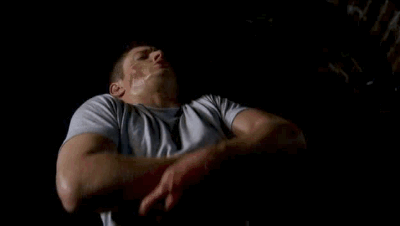
Wasn’t mad about this bit...
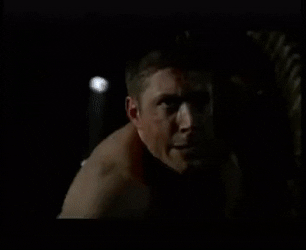
Coulda done without this bit tho...
In “Hookman”...alright, you kinda got me on “Hookman”, but we do get the first appearance of the rocksalt shotgun and Sam talks with a girl about her dad issues which is really Sam talking about his own dad issues in the language of tv shows. Also, he maybe starts to move on from Jessica???? It’s unclear, and also a little weird but I guess he’s only 22 and that’s not that far off from 18/19.

Really, WB?? Sneaking into sorority houses?
And then in “Bugs”, yes, even in “Bugs”, we get juicy little bit of tension between the brothers as they advise some teen boy about family dynamics. The fight shows a lot about what each character feels about their own experiences growing up the way they did, how they manage the expectations from their own father, and how they believe those family dynamics should exist. I mean I guess you could also argue this is the episode that plants the seed for Wincest, but I don’t really want to go there, let’s not talk about it.

This kid’s like, “This is...not a conversation about me and MY dad, is it?”
So they could be worse. I mean the last two definitely aren’t great, and we’ll see how they measure up to the Monster Truck episode later in the season, but they’re not bad episodes.
So let’s flash forward to Now again - have we seen the end of Filler Episodes?
As I have mentioned in previous posts and will probably continue mentioning in future posts, the 22 episode season is not the norm anymore. A lot of articles I’ve read point to Breaking Bad as the first American show to really break that mold. Breaking Bad released only 7 episodes in it’s first season in 2007. When you’ve cut your story down that much, there’s no room for filler - you’re basically producing a 7 hour movie.
Now notice I said American TV show. I’m pretty sure for most of the rest of the world, 22 episodes is way outside the norm, but really I can only speak to UK TV. Seasons in the UK do not last as long as seasons in America. Doctor Who, one of, if not the, longest running show on BBC, aired its first season with 42 episodes, which is mind boggling. But since the series revived in 2005, it hasn’t had more than 13 episodes in a season. Spooks/MI5 never had more than 10 episodes. The IT Crowd only aired 6 episodes per season. Broadchurch had only 8. And because I must complete the Superwholock trifecta, Sherlock seasons were only 3 episodes a piece. These are the shows that spring to mind while I’m writing this, but you get the idea.
So why does American broadcast TV have such long seasons? Well, the answer is: moneymoneymoney.
We live in an age of “prestige” TV. Some throw around “Golden Era”, but there’s been like, a Golden Era of television every 10 years since tv’s became household commodities, so that phrase basically means nothing. TV today is more similar to long-form film making than it was a decade ago. We associate terms like “film” with other terms like “art”, and sometimes we forget that television is, and always was, a business. It’s a business that’s making a lot of money entertaining you for hours on end, but a business nonetheless. I’d argue that it doesn’t mean it’s not art, but I don’t think we can separate the art and entertainment value of tv from its actual monetary value.
Strategically, the 22-episode season was to get a show to a magical number of total episodes - 100. Once you hit the 100th episode, somewhere around season 5 (thanks math), then you can sell the show in syndicated reruns. This is also referred to as second-run syndication or off-network syndication. When a show is syndicated, that means the production company that produces the show can now sell the right to air episodes to other channels. Think channels like TBS or TNT or even USA Network - they don’t really dabble in producing their own content, they just repackage content from other networks to plug in to empty slots in their programming. And because these channels can air episodes 5 days a week, 365 days a year, that means the production company can actually make more money by selling the show in syndication than when they sold the show to the primary network. The more episodes you have in a season, the faster you get to syndication, and sometimes that means a show that’s on the brink of cancellation due to poor numbers may still get greenlit for another season or two if they’re closer to that magic 100th episode. For a show like Supernatural, that has a very procedural, not-super-heavy-mythos, structure, you can do very well in syndication. Just cuz another network agreed to air your show doesn’t mean they agreed to air it in order, so procedurals work better in syndication than your season-arc shows do. And that’s why we have episodes like Bugs, that have nothing to do with the overarching plot of the season and also phone in some questionable CGI.

Apparently they DID use real bugs to shoot this scene and everyone got bit to hell but the bugs didn’t show up good and they went with CG anyway?!?
But these days, you don’t have to hit 100 episodes. Sometimes only 80 episodes will do. Sometimes, you run a streaming site and you don’t have to worry about reruns at all because your revenue isn’t generated from air time or even ads, but from subscription prices. Honestly, when you think of it that way, it makes way more sense to greenlight shorter seasons so that you have the budget to buy more and more diverse shows that will appeal to a broader audience of viewers.
So if Supernatural was produced today, would we get these off-shoot, self-contained episodes that have little to do with the plot of finding Sam and Dean’s dad? It’s hard to say. Knowing what I do about Kripke’s original plans for the show and his thoughts on procedural standalone episodes in general, its possible that he’d still try for a traditional season aired on a traditional TV network. But in that same interview I quoted above, he also mentions that the only way to get into a show with a heavy mythos is to buy the DVDs. We don’t need DVDs anymore - we have Netflix. And Hulu and Prime and any number of other streaming services that pick up any show they can get just to have a larger library of content and attract new viewers. I think a good indicator of what Supernatural would look like if it aired today is Hulu’s Helstrom - a show about two siblings with a childhood marked by strange and terrible happenings, who spend the season trying to defeat an evil demon. This show is a Hulu original that dropped all 10 episodes on October 16, 2020, and damn if that doesn’t sound familiar. I told a friend, “it’s like Supernatural but more emotions.” (Her response was, MORE emotions?!?!?) And before you dive down the rabbit hole, the characters in Helstrom made their debut in a Marvel comic back in the 70’s, so you can just chalk it up to nothing new under the sun.
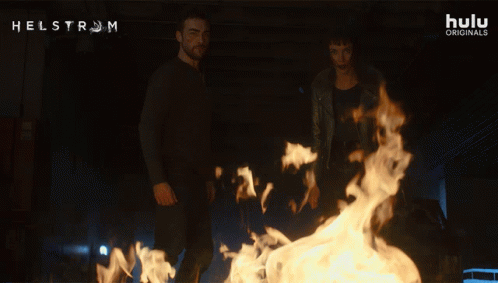
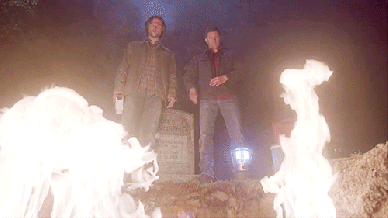
Big Mood, guys. Big Mood.
I’ll close this one by reiterating I don’t mind a filler episode. Some fillers can be weird and great and wonderful. I’d say “Tales of Ba Sing Se” (Avatar the Last Air Bender, Season 2) is a great example - with the possible exception of Appa, the vignettes presented in “Tales” are basically side quests that have nothing to do with the main quest of season 2 and only serve to develop characters. The stories are sweet and touching and also light and fun.

I’m not crying, YOU’RE crying! It’s ok, I’m also crying.
And the longer a show runs, the more likely you are to run into these fillers - episodes that take a break from the main action to bring something that’s new and out of the box and possibly/probably writers getting bored with the every-day formula of the show. I think season 1 of Supernatural does a decent job of balancing the two styles of episode so that neither gets boring. In fact, I’m pretty Supernatural was what taught me the difference between the two episode styles in the first place. And the first time around, I was hyped for those season arc episodes, because back in the late 2000’s, I hadn’t seen a lot of TV content like that. Now, 15 years on and mired in a sea of seasons that stick mainly to a season arc story with little to no room for breathing, I think that if all TV became nothing but season arc episodes...well, it’d get pretty boring.
#Supernatural#Supernatural Season 1#Bloody Mary#Hookman#Bugs#Skin#Jensen Ackles#jared padalecki#kripke#helstrom#Filler episodes#TV#TV history#Supernatural Rewatch#CW#Sam#Dean#Winchesters
2 notes
·
View notes
Text
The Teleprompter Interview: Katy Wix ‘My First Screen Crush was King Kong’
https://ift.tt/33I5zd9
“Anchors, rigging, shackles,” lists Katy Wix down the phone, “poop deck, wheelhouse, three sheets to the wind…” The comedian and writer has had a productive year. Filming wrapped on Ghosts series two just as UK lockdown began. Since then, she’s finished one book – Delicacy: A Memoir – due out next April, is pitching another, writing a TV show, and thanks to a new-found obsession with Netflix yacht-based reality show Below Deck, has also managed to acquire an enviable grasp of nautical terminology.
Wix is an established UK comic actor, with credits across the board, starting with cult hit Time Trumpet and going mainstream as witless, lovable Daisy in BBC mega-sitcom Not Going Out. She’s currently part of Channel 4’s Stath Lets Flats, the hottest comedy around, fresh from multiple Bafta wins. She plays Fergie in royal satire The Windsors, and was among the comedian-contestants in series nine of Taskmaster. In BBC One sitcom Ghosts, Wix plays Mary, a 17th century yokel burned as a witch and now part of the motley group haunting a modern-day stately home. Mary’s distinctive west country accent “just came out”, says Wix. “It’s an insult really, because I can’t claim to do that accent well. It’s sort of a stock noise. The more I do it, the more I think it sounds like Nanny from Count Duckula. Ducky!”
Ghosts series two, which lands as a boxset on BBC iPlayer on Monday September 21st , will give fans more about Mary’s background, says Wix. “I think people will really love it, and then there’ll be another series next year, depending on the big C. Not cancer. The other big C.”
From superyachts to Alan Partridge, The Day Today to Ghostwatch, Anna from This Life to formative sexual fantasies about prehistoric apes… here’s the Katy Wix Teleprompter interview.
Your parents were quite arty, working in dance companies and the theatre. Did your childhood allow for much TV watching?
Oh my god, yes! My routine was: come home from school, watch the tail-end of Fifteen to One, and when I was really young, repeats of The Oprah Winfrey Show. Then it would be The Broom Cupboard, something like Round the Twist, then the sound of the Six O’Clock News and turning over to The Simpsons. I still do it now, if I’m at home and it’s five to six, I’m going to watch The Simpsons, it’s a tradition.
Welsh telly was slightly different to the rest of the country. We have S4C rather than Channel 4. I remember going through the TV listings and seeing what was on normal Channel 4, like The Word, then I’d look at Welsh Channel 4 and it would just be something boring in Welsh at the same time.
Was there a TV show that inspired you to start acting and comedy?
The one I remember the most is Abigail’s Party. Seeing Alison Steadman’s performance made me want to do character acting. It was just a phenomenal, convincing, detailed performance. Years later, I wrote a radio sitcom that she was in. It was one of those absurd moments where you just have to leave your body and look down on yourself to be able to handle it.
That must happen a lot, you’ve been part of a lot of great comedy casts…
What got me into comedy was Brass Eye and The Day Today. When I was about 15, that’s what changed my brain. It was the first time I’d seen adults being silly and coming up with absurd situations that were my sense of humour. Before that, comedy on TV would always feel like just something your parents would watch but this really felt like it was for us, for me and my friends. It was the same with The Office.
And then you were in This Time with Alan Partridge with Steve Coogan last year.
I was in sixth form when Knowing Me, Knowing You came out and I had it on VHS. Watching people like Rebecca Front and Doon Mackichan… anytime Alan had a guest on the sofa, the level of detail and all the reactions and the tiny little social awkward moments, that made me think I want to do that type of performing. So then, when I got to be in the last Partridge, it was mad. It was phenomenal to be that near to the character and all his tiny micro-expressions. Even the colour of his socks – this weird salmon pink – that was so perfect. Tim [Key] was there as well and we’re old pals, so that made it feel more like, well if Tim can deal with it. But I think even Tim now says he still has times where he has to go into the loo and give himself a moment.
Who or what was your first TV love?
This will sound like a joke, but I swear to God it’s true. It was a running joke in our family that my first crush when I was about four, was King Kong [laughs]. My mum used to tease me about it all the time. It was the combination of brute strength and these massive, soulful, pained eyes – which I still look for in men – that absolutely got me. It was an erotic connection for me. When I look back on it in a Freudian way, it feels like a really obvious, very heterosexual image for a little girl to have, because I wanted to be that woman in the nightie in his massive hairy hand.
Unusual, yes, but then a lot of people our age cite the fox in the Robin Hood Disney film as their first screen crush.
I do get that. I do get that. What was it about that fox?
He’s rakish. And politically, he was sound too – rob from the rich, give to the poor.
You’re right. And he was really confident too.
Growing up, which TV character did you idolise?
There are two, a younger one and a slightly later one. When I was 11 or 12, I wanted to be a fashion designer. I would draw outfits all the time in my school books and I had the Usborne Book of Fashion Design and spend hours on it. So I wanted to be Hilary Banks from The Fresh Prince of Bel Air because she just had incredible fashion. She always got boys and she was really cool and confident and wore amazing clothes. She was everything I wanted to be.
Then a little bit later, maybe sixth form or in my early 20s. I wanted to be Anna from This Life, so much and I kind of still do. Because she was tall and really cool and had dark hair and a lot of attitude and wore black a lot and smoked a lot and didn’t give a shit. That was my vibe at university.
Is there a TV character you’d like to be now?
Probably still Anna?
Which TV show gave you nightmares?
The massive one for me, when I was about 11 or 12: Ghostwatch. I went to a friend’s house to watch it and I remember being a bit like ‘yeah right’ watching it, and then when I got home that night, I just cried. I was in the bath, hysterical and my mum had to come in and calm me down. It was horrendous.
Everyone totally swallowed it at the time, because we were less TV-savvy in 1992. I remember they had a phone-in and someone called in to say ‘There’s a shape in the curtains’, which really fucked me up. The whole Pipes thing. I remember being in my bedroom and seeing a shape of an old man in the curtain all the time. I’ve got really vague memories of Craig Charles being in a park, saying that someone had killed a Labrador. I was thinking about watching it again. I actually don’t know if I dare.
Read more
TV
50 best British comedy TV shows on Netflix UK, BBC iPlayer, Amazon Prime, NOW TV, Britbox, All4, UKTV Play
By Louisa Mellor
TV
Not Going Out: the top 10 episodes
By Philip Lickley
When did you last cry watching television?
Last night. Have you ever seen the show Below Deck? I’m obsessed with it. I’m not massively into reality TV but it’s an American reality show all filmed on superyachts that rich people charter. It’s almost like a perfect sitcom family – you have a different captain every time and the deckhands and then the interior, who do the hotel stuff, and then you have the chef, who’s always a temperamental big personality and then each episode has a different group of insanely rich, usually quite horrible, sexist people with loads of money who get really drunk, that’s the premise. It’s non-stop drama. You’re just watching people fall off boats and have arguments.
How did it make you cry?
In this episode, there was a girl who’d been really quiet and grumpy and everyone was slagging her off, and then she revealed that she’d got a text that morning saying her estranged father had died, so that’s what set me off. It’s got me through lockdown, it’s so addictive.
When did you last laugh out loud watching television?
Below Deck, same episode!
All human life is there!
I think it was someone’s malapropism, that’s my favourite thing about reality TV, the way people talk in a kind of Stath-like way and get it wrong.
What was the last TV show you recommended to a friend?
Below Deck! [Laughs] I’ve just got Lolly [Adefope] onto it, and Adam Drake – he’s a comedian in a sketch show called Goose and does Capital, a podcast with Liam Williams – he’s now devoted. One of my best mates was bemoaning that her boyfriend’s not into reality TV, but boys can watch Below Deck too. It’s got loads of boat stuff in it. Chains and anchors. I’m learning all these terms, like shackles, poop deck, wheelhouse, three sheets to the wind… That’s where the expression ‘in my wheelhouse’ comes from. Three sheets to the wind means you’re sailing off course.
Which TV show would you bring back from the dead?
Changing Rooms.
Good call.
I also loved The Late Review. I really loved that.
What’s a TV show you wish more people would watch?
Do you know Iyanla Vanzant? She started off on The Oprah Winfrey Show – I love Oprah so much – and she’s a TV therapist/healer/spiritual. She’s got a show you can only get on American TV called Iyanla: Fix My Life. She just speaks so much wisdom. She spends a week with people who are really traumatised and it’s their healing journey. It’s so moving, it’s so profound. She’s doing incredible work for the human race.
She did an amazing show called, I think, ‘The Myth of the Angry Black Woman’ with a house full of women of colour who all got to talk about this trope that they were angry and how they felt unable to speak without being silenced. She did a show that was rehabilitating people that had come out of prison and women that had been sex workers all their loves, just amazing.
Which current TV show do you never miss an episode of?
In lockdown, what kept me going was I May Destroy you, obviously, Below Deck, obviously. I also became obsessed with the Japanese Big Brother Terrace House, but it just got pulled because there was a suicide. It was so, so awful. I read an article saying the producers didn’t behave well, so I feel like I can’t like it any more. I love Succession too. I started watching this show on Netflix called Intervention and got totally obsessed with it. Again, it’s maybe ethically a bit dubious. It’s American, obviously, and they’ll film an addict who’s in a really desperate state and then the family kind of trick them, or persuade them to go into a room and then the intervention therapist is there and they’re like ‘Guess what, you’re going to rehab now!’ Anything that’s got human suffering, and then a redemption story in it, I’ll watch.
Given the power, which TV show would you commission?
I think about this a lot – what if I had a channel? I’d commission the sketch group Sheeps to make tons of series. That’s Liam Williams, Al Roberts and Daran Johnson, and so far they’ve only done live shows, but I would commission them for hours of TV. Colin Hoult doing his character Anna Mann, I’d commission hours of that. Everyone involved in Stath Lets Flats, I’d just say ‘Turn up, pitch and we’ll make it’. There’s a documentary from the 70s that I adore, that I would like to show again, which is John Berger’s Ways of Seeing. It’s one of the most beautiful, gentle documentaries. I feel like that should be on TV. And just whatever Gemma Collins is doing, commission that.
Also, you know in the 90s, late at night you’d get some weird, bizarre performance art happening on BBC Two? I miss that. The sort of stuff that was on after The Word. And then finally, maybe just all of Peep Show again?
What’s the most fun you’ve had making television?
Ghosts is where I probably laugh the most because of Lolly [Adefope]. We make each other laugh all the time. When me and Anna [Crilly] did our sketch show on Channel 4, it was incredible. It was stressful but exciting. It was such a nice atmosphere to be with all these gorgeous people that you find funny.
Stath Lets Flats is like that, because we’re all genuine mates. When people take comedy so seriously I really love it. I love that attention to detail. Jamie [Demetriou] and everyone involved really cares. There’s no ‘that’ll do’ attitude, everyone wants it to be the best it can be. Why not treat comedy as a science that you have to absolutely get right?
cnx.cmd.push(function() { cnx({ playerId: "106e33c0-3911-473c-b599-b1426db57530", }).render("0270c398a82f44f49c23c16122516796"); });
Ghosts series two starts on Monday the 21st of September on BBC One at 8.30pm. All six episodes will be available to stream on BBC iPlayer from then.
Delicacy: A Memoir by Katy Wix, published by Headline, is available to pre-order now.
The post The Teleprompter Interview: Katy Wix ‘My First Screen Crush was King Kong’ appeared first on Den of Geek.
from Den of Geek https://ift.tt/32GM7ya
2 notes
·
View notes
Text
Being Human (UK)
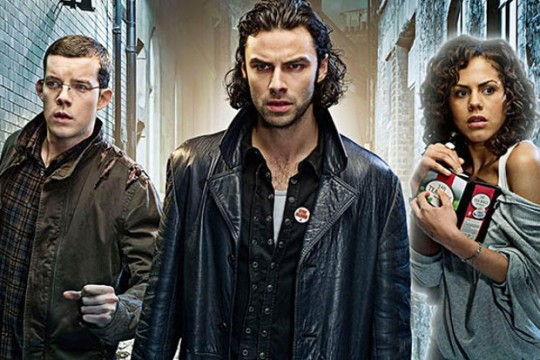
This is a show that I recommend to people... but I add a lot of caveats.
The recommendation: A werewolf, vampire and ghost are flatmates. This show is hilarious! So much macabre and slice of life humor! And horror and whump!? Also, the show was run by a side-channel of BBC (BBC3) and I guess they had no production money, so the actors mostly look human and they just refer to each other as being a 500-year old vampire or ghost or whatever. Which makes it even better. The werewolf is Jewish, recites a Jewish prayer at least once, and hangs out watching “The Real Hustle” with the vampire. They work in a hospital as janitors. The ghost has a habit of making everyone tea to soothe herself and the flat is cluttered with tea mugs everywhere all the time. Also, people do get fang-y or wolf-y or do weird poltergeist stuff. And gore happens.
Longish post, more below the cut.
PS, this is the 2008-2013 UK version of Being Human, which I hear had a cult following. There’s certainly stuff on Tumblr. I found the BBC version through the US remake of Being Human, but I’m much more charmed by the BBC version. (The US version has the vampire and werewolf as hospital doctors? Why?) Also I watched the show maybe 4, 5 years ago, so impressions are from that.
And the caveats: There’s a lot of sexism which was hard to watch. It’s engrained in the premise and plot and occasional gross sexist jokes. And there’s other problematic stuff in the writing. It’s like having glass shards show up the meal you are enjoying, and it’s why I’m not sure I’ll rewatch the series (or not in it’s entirety, anyway). There’s also a limited spinoff web series called Becoming Human which also had some problems for me, including some gross sexism and fatphobia. (John Boyega from Star Wars does show up as a character in that series, for anyone interested.)
Back to Being Human and overall series recommendations. So the 1st season was good. I kind of forgot what happened in the 2nd and 3rd season (I think they got depressing and slow?). The 4th season picked up again, much to my surprise, and I remember liking the 4th and 5th season a lot. Even though [spoilers] there was a complete cast change by this time. But it worked, somehow. The show did go from at least having one woman of color to having an all-white cast at the end, which was not great. And there’s other racism too.
For people who like their happily-ever-after: uhhh so I vaguely recall that a lot of characters don’t really get a happy ending. Granted, half of them are walking around dead already, so...? Overall, the ending of the 5th season is... Is that a happy ever after? Happy for now? The Bonus on the DVD kind of makes it a happy-for-now with a continued possibility? It’s an acceptable HFN?
.....And now, the notes for all the hurt/comfort people and whumpers:
Holy crap people, there is SO much h/c and whump!?
OK first -- George the werewolf. George’s transformation sequence, SUPER whumpy.
youtube
Also, George ends up naked often, come to think. And he screams a lot during the show, for various reasons. The actor himself, in the bonus DVD interviews I think, cheerfully says something like, “People really like the way George screams, I do too.” (This is like when David Tennant cheerfully talked about how he enjoys playing a character who is unconscious and sick and gets fussed over by people.) And George is a very sympathetic, nerdy character who is easy to feel for. Who occasionally turns into a SNARLY SCARY WEREWOLF AGAINST HIS WILL. As mentioned, I think I liked season 1 George more than seasons 2 or 3.
Emotional hurt/comfort -- so Annie the Ghost provides a lot of the emotional centering, as I recall. Throughout all 5 seasons, all the characters lean on each other for support and there’s a lot of lovely warm fuzzies from that. Also, one of the later werewolf characters, Tom, is generally a sweet kid. I’m glad they didn’t do too much of the transformation horror with him, honestly. George/Russel Tovey could carry that, but I thought Tom’s strong point was looking puppy-eyed and folorn-eyebrow’d and trying to navigate the world with a mix of naivety and half-feral-ness.

Above: exhausted naps on the couch.
Below: Classic Being Human humor. A review of house rules and vampire stabbing etiquette, between Annie and Tom --
youtube
[Spoilers from here on] Okay, so as mentioned, the cast changed over between season 4-5. And to my surprise, I think I loved the new trio as much as, or more than, the original trio. I liked how loud Alex the ghost was. And I liked both Annie and Alex.
Also, I did not expect this either, but I got so interested in Hal! Yo! First of all, Hal is a centuries-old Vampire and speaks/looks like, idk, a Regency Character. And then 19-yr old Tom puts Hal to work at a fast food shop and bosses him around, and Hal’s indignation is hilarious. So already, this is excellent.
And somehow, Hal is very, very whumpy? So: the character of a “vampire who is trying to be good and suffers” is not new, and I’ve encountered versions where I haven’t been interested. (I was lukewarm about Mitchell, the original vampire in the show.) But for whatever reason, I really dug Hal. Maybe, for me, Hal was just the right mix of very serious and earnest but also ridiculous and tragic all at once. (I read some interviews with the actor Damien Molony, who mentioned how he’d done a lot of history and addiction research in to prep for the role. The new trio actors also had a lot of chemistry and fun on sets, it sounds like. So I might be picking up all that.)
Also, Hal is actually two characters -- the ridiculous indignant serious Good Hal who is desperately trying to keep the horrible, rude, murderous, Bad Hal from taking over. But, as one of the show producers, a woman, cheerfully commented in the DVD extras: “And then Bad Hal shows up, which is great, everyone likes a bit of Bad Hal”.
Honestly, why do we even pretend to hide our fascination with the macabre and the whump, when showrunners and actors are cheerfully not hiding it all.
Here’s clips of Good Hal in Season 4:
youtube
Oh, I forgot about this part until I rewatched the last clip -- but at the end of season 4, Hal asks his flatmates to forcibly bind him to a chair, because he’s trying to fight off Bad Hal. Based on my perusing of the whump community, pretty sure that scenario is of interest to someone.
Also notable is the episode “No Care, All Responsibility” (Series 5 ep 3). In one scene in particular, where Natasha has offered Hal a way to control his bloodlust and there’s this mix of vulnerability and power with Hal asking Natasha to put a stake against his heart, I remember thinking -- “I bet a woman wrote this ep and I bet she knew exactly what she wanted”. And I was right, that woman is Sarah Dollard, a queer woman who has also written a lot of other things (including Doctor Who). She also wrote Being Human goofy web extra eps with Alex, Hal and Tom called “Alex’s Unfinished Business” and they are so good ! (Interview).
Also... the opening 3-minute backstory in “No Care...” made me cry. You get a glimpse of the show’s baddie showing real care and emotion in rescuing this little kid (an important character). When this kind of scene is done well, it just gets me. every. time.
Anyway here’s an appearance of Bad Hal (much later), being completely awful, murdering people and turning them into vampires and singing Broadway tunes during this.
youtube
Side note on Vampire narratives. Although Hal’s narrative arc of season 5 was interesting, and I’m aware this is show is urban fantasy, I still have qualms of the show enforcing IRL stigmas/ideas that addition is incurable and addicts are doomed. They’re not. (General overview on NIH page.) Addiction research is a growing field. From listening to NPR and reading articles, my impression is that addiction treatment will change quickly in the next few years. Related to the vampire blood addiction trope, Terry Pratchett covers vampires finding ways to be “dry” (one vampire, Maladict, swaps out blood addiction for coffee addiction) and you can find fanfics about the topic as well. (General link to Being Human Ao3 fanfics, why not.)
Side note on Hal’s dual characters -- recently, I did consider, “Is there overlap with Hal and portrayals of Dissociative Identity Disorder (MPD) folks?” IRL DID people have complained about movies with gross portrayals of people with DID. To me, Being Human’s Hal feels removed from that and closer to a fantasy.... but, I’m also not multi, so.
* Update: after having learned more about plural history, I’m even less sure now. (Note: my opinions are of someone who isn’t plural, as far as I know, so note that.) There’s a number of early problematic movies and books that hugely affected the popular narratives of plural people in the west, and still affect how therapists and non-plural people treat plural people even today. These include the movie “The Three Faces of Eve”, which has the narrative of “Good Eve, Bad Even, and later smushed together become ‘Fixed Eve’ or whatever”. There’s practically a whole lecture series on how the books/movies were made with sensationalism and formulas in mind and pretty gross things. Chris Costner Sizemore, the IRL Eve, had to fight the movie studios in court because the studios claimed they owned her life story. (There’s practically a whole lecture series on early plural history in the west, I might link more information later). Like, even today, multi people feel pressured to hide their plurality because they are afraid singlets or other people are gonna say “oh so which one of you is the ax murderer”, or that they are going to be fired from work. So.
This post turned into a “Being Human seasons 4 + 5 Appreciation Post”. I guess Season 1 and 4, 5 were my favorite. I watched the show through library DVDs, but I think there’s eps of the show on YouTube. The DVD extras are probably on this YouTube playlist?
(Also, there is a pilot episode, with different actors except George/Russel Tovey. I don’t think one needs to watch the pilot to watch the main series; I kind of recall that the main series recycled some of the pilot. There is a funny scene in the pilot where George and Mitchell meet Annie.)
Being Human: a macabre, hilarious, horror-filled, flawed, sometimes dragging, emotional, whumpy, oddball show that I still think about sometimes.
#being human#being human bbc#annie#mitchell#george#alex#tom#Hal#vampire#werewolf#ghost#bbc#bbc3#being human 2008#whump#hurt/comfort#gore#good hal#bad hal#macabre humor#russell tovey#i see russell tovey in other roles and each time I'm like 'GEORGE!?'#lenora crichlow#Aidan Turner#Sinead Keenan#Michael Socha#Damien Molony#kate bracken#vulnerable men#being human uk
7 notes
·
View notes
Text
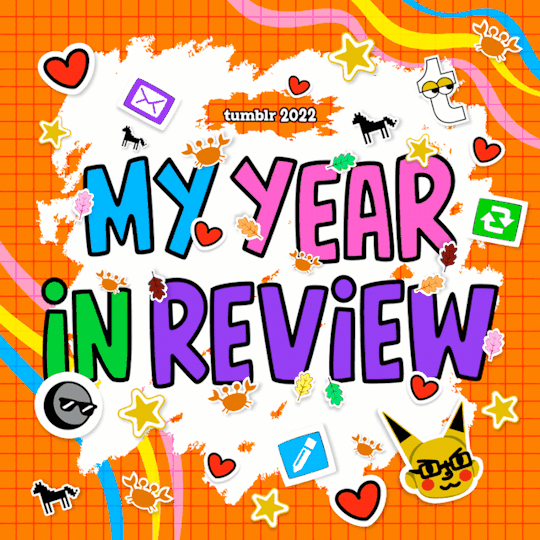
I posted 19,562 times in 2022
420 posts created (2%)
19,142 posts reblogged (98%)
Blogs I reblogged the most:
@andrey-daddano
@awigglycultist
@chaoticgremlinwholikescheese
@szollibisz
@les-amis-de-llgbt
I tagged 2,200 of my posts in 2022
#owen rambles - 179 posts
#watch me bitch about the rugby - 142 posts
#tua s3 spoilers - 117 posts
#spies are forever - 86 posts
#starkid - 73 posts
#ghost files - 65 posts
#top gun - 64 posts
#st4 v2 spoilers - 63 posts
#stranger things - 51 posts
#the band ghost - 50 posts
Longest Tag: 140 characters
#they just know it from the soviets who were perpetually in a fucked up state between capitalism and communism cause they went down the lenin
My Top Posts in 2022:
#5
Being a Brit and being into bbc ghosts and seeing all these non-brits enjoy feels so weird to me and I don't mean it in some brit superiority complex way cause im not fucked up that way but i mean it in a 'i genuinely forgot not everyone knew the six idiots from horrible histories' kind of way
like I feel a big reason so many people originally watched ghosts here in the uk when it aired is because they recognised the six idiots as 'that lot from that history skit show that were dead good' and then watched it because of that and fell in love with it that way instead of how the non-brits saw us losing our shit over this show made by people that a lot us grew up watching and decided to join us
i dont know what the point of this post is.
59 notes - Posted October 16, 2022
#4

this is what he wouldve wanted
82 notes - Posted March 10, 2022
#3
me,looks at canon:
me: i choose to ignore this, these two idiots are in love and they are very happy about it
200 notes - Posted January 5, 2022
#2
im getting top surgery but its just a really hot man stepping on both on my tits until they burst like balloons
221 notes - Posted September 19, 2022
My #1 post of 2022
How to write a D/deaf or HOH character without being a bitch
Written by me, someone who has been HOH my entire life and had a hearing aid for half of it.
Okay so you are wanting to write a character that is HOH or D/deaf but you are neither and rightfully don't want to offend people in our community. Well lucky for you here is a guide to writing those characters.
All D/deaf and HOH characters:
- Not everyone who is in the community was born with it. Many people lose their hearing later in life. And this leads onto
- Not every D/deaf and HOH person has the 'deaf accent'. This is because as stated above some loose their hearing later in life and others, such as myself, can hear decently well without an aid in.
- Also not everyone who lost their hearing later in life lost it in some major accident, many simply lose it just due to genetics or prolonged exposure to loud sounds without giving the ears a chance to heal.
- The best way I can put this is every D/deaf person is HOH but not every HOH person is D/deaf. Part of this is up to peoples personal preference and part is up to the fact that many HOH people have decent hearing without an aid in.
- People can go years without themselves or others realising they have hearing loss. I myself for example have had hearing loss since birth but it didn't get picked up on till I was around about 4.
- If hearing loss is discovered in someone the doctors are going to want to find out why you have hearing loss and this leads to tests. Most of the time it'll just be an MRI. This also means that the character and/or characters guardian will know why they have hearing loss
- There are levels of hearing loss and all of them are: mild, moderate, moderately severe, severe and profound. Sources on these are found all over the internet.
- You also have multiple types of hearing loss. You have, I guess people who aren't D/deaf or HOH would call it the 'normal' type of hearing loss, which is hearing loss across the board, you don't hear some frequencies easier than others; then theres low frequency and high frequency hearing loss and this is when you can't hear a frequency as well as another. I for example have low frequency hearing loss meaning I can't hear sounds that are low pitched sounds as well as I can hear high pitched sounds and for people with high frequency hearing loss it's the other way around. The last two aren't like your hearing is fine with other frequencies you still have difficulty hearing that one but it's easier to hear than the other one.
- There are also other types but these depend on where the hearing loss is situated within the ear. Theres absolutely loads on these already online but a quick summery of them is: sensorineural hearing loss, the most common and affects the inner ear, can't be treated but many with it find hearing aids helpful; conductive hearing loss, not as common as sensorineural but quite common in kids, affects the outer or middle ear, caused by sound waves being blocked in the ear canal; and finally mixed hearing loss which is as you can probably a guess a mix between sensorineural and conductive hearing loss.
- If your character is going to get an hearing test they go to an audiologist. Hearing tests usually happen every 6 months and audiologists are located in hospitals or any NHS centre.
- Not every D/deaf and HOH person knows sign language
- Not every D/deaf and HOH person can lipread
- And most people who are D/deaf aren't completely D/deaf, they still have some level of hearing however it is by no means enough to hear the volume most sounds are in day to day life
- There are some people who have hearing loss as a child but as they get older it clears up, there are several reasons this can happen but the most common is glue ear which can also happen in adults.
- D/deaf and HOH people aren't completely hopeless without an aid like some people think. This is so important. If that person doesn't have an aid then they know what they're doing, if it obvious that they are struggling then you ask to help and only help if they then give you permission to. If they say no to your help, don't help them, simple as. If a person has an aid then we're prepared for if we forget it on an off chance or if it breaks. We don't need an able bodied person there for everything.
- This goes for every disability where a sense is lost but a persons other senses aren't enhanced because they can't hear as well as others. In fact most people I know in real life with hearing loss need glasses.
- Not every D/deaf or HOH person has an aid. There are types of hearing loss where an aid will not help and many people either can't afford an aid or haven't gotten it diagnosed.
Characters with an aid:
- Hearing aids don't magically fix a person hearing. We still struggle, we still need people to repeat things, our hearing doesn't become perfect.
- Hearing aids aren't the only type of aid you can get for hearing
- Kids will sometimes get grommets which are these little donut shaped things which are put in the ear via surgery and then they fall out after a bit
- Also kids with a hearing aid will usually have one with an in ear mould. And let me tell you there are so many designs you can get. From the ages fo 7 to 12 I had a red sparkly one, a black and white marble one and a silver sparkly one, my cousin has a the Manchester City logo on his mould and my best friend in primary had a lion on his.
- You can also get in ear mould ones when you older and also have cool moulds so let your characters have these crazy cool moulds.
- Hearing aids also supposed to be cleaned regularly (not with alcohol or liquids or it'll break the aid) but my audiologist never told me that so in all the 7 years I've had an hearing aid so I've never cleaned either one I've had, so it is recommended that you clean them but not necessary. I think. Don't hold me on that.
- Hearing aids are cleaned in this little tub where you put this little circular thing which is supposed to removed all the liquid in the container and hearing aid when the tub is shut. Hearing aids with moulds have there tubes cleaned with a pump and hearing aids with domes are cleaned using these thin red strips.
- There are many different types of hearing aids: behind the ear (BTE), mini BTE, in the ear (ITE), middle ear implants, in the canal and completely in the canal aids. All of these are unique and wouldn't fit on a post but there are many resources online for your research.
See the full post
301 notes - Posted February 7, 2022
Get your Tumblr 2022 Year in Review →
0 notes
Text
Hi
‘I thought about writing an intro post for a couple of days and not known what to write. I could talk about the last month or so, or I could go back to the beginning.
So here I am. It’s hot, my laptop is slow. It’s 11pm and I’m half watching ‘America’s Hate Preachers’, drinking wine, surrounded by dragon’s blood incense. I’ll go back to the start:
I was born in Bristol, UK, and baptised Lydia Joy Ginley. You can probably guess from the surname and the baptism that some of my ancestors were Irish Catholics. It was my great granddad. Thankfully, it was very watered down by the time it got to me. I did go to a Catholic primary school but it wasn’t all strict and run by Nuns (though there were a few angry Irish teachers). I’m sure at some point I truly believed in Catholicism, just as children believe in Father Christmas. But I didn’t by the time I was 11, I remember being obsessed with ghosts and the supernatural.
So one side was catholic but my mother certainly isn’t. One of her friends is a medium. I was brought up with that being normal and there was no doubt in my mind that she wasn’t honest. She moved to South Africa but still keeps in contact, I’ll come back to her later. Mum joined circles, met her friends spirit guide (a native american which is apparently the stereotype). I remember a BBC children’s programme in 1997 called Aquila about two boys that find a roman spaceship. Everyone thought their next door neighbour was mad as she could see and talk to a native american who gave her advice. She was given pills and was convinced she was mad. I think it ended happily with her throwing out the pills and the two boys believing her. But I knew it was her spirit guide, I thought it was obvious.
My Mum said that once in a meditation was taken to the ‘Hall of Learning’ (spiritualists believe this a place in the spirit world that contains great knowledge of the spirit world). My Mum asked her medium friend that, if that was the hall of learning, why didn’t she learn anything? She told my Mum that she had learned something, she learned that it existed. So that was suddenly a thing in my life.
My secondary school was not religious at all and always failed the OFSTED thing for RE. I kept my love for the supernatural - everyone remember ‘Most Haunted’? I was obsessed! I didn’t really thing about religion or spirituality much, I was too busy immersing myself in maths, science, art and depression. I had a passion for biology.
At some point my sister started working at a shop called Crystals. I though crystal healing and stuff was all bollocks. But then many people I did not expect said they didn’t like going in the hop as it made them feel funny, they had weird sensations, etc. Two of these people were devout Catholics and one was a blokey bloke gardener. That was enough to convince me that there is something to it.
At uni, I made friends with many goths.Some of these were pagan (or pretending to be to look cool). I found it really interesting, I read books. But to me, I found it interesting in a history nerd way. I know what I mean. It was just something from history that we had long since disproved. But I did relate to nature being related to spirituality. Sometime around then, my mother discover a lot of old photos and paperwork. She discovered that her grandfather and his father were Druids. I found this really interesting. I wanted to be inspired by this, I researched. I liked it but just wasn’t grabbed. At uni I developed mental health issues. I tried some of the things I had read out of desperation but didn't really get it. I met my partner at uni, they were vaguely interested in paganism too but was mostly agnostic/atheist.
Then that last few years, we’ve not had much time to focus on spiritual things. Life has happened. My partner became disabled and we both came out as transgender. I’ve also still been struggling with my mental health.
But life has started to go in the right direction. And in the last month or so, I feel like Loki has walked into my life. That’s for my next post.
4 notes
·
View notes
Text
“In retrospect, I should have had the absinthe…” Eleanor Goodman Talks The Reality of Metal Journalism
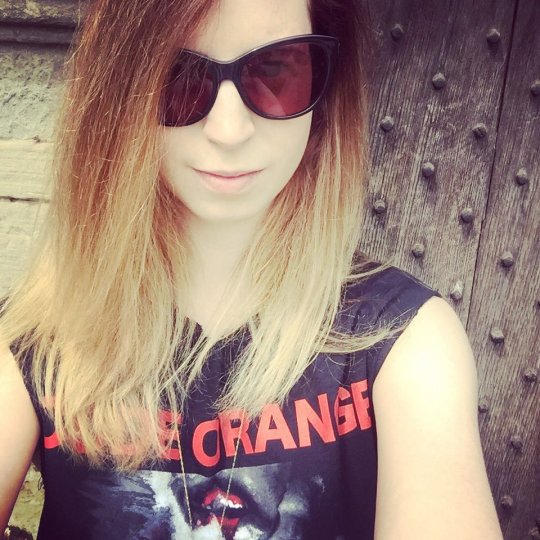
Photo via Twitter
Print journalism isn’t what it was - just take one look at NME. However, there are still plenty of music journalists who still strongly believe in the power of print, and no one knows this quite like Metal Hammer’s deputy editor Eleanor Goodman. Here’s what she has to say on how to deal with the ins and outs of journalism and why lawyers are always good to have around just in case you need to write about bestiality.
How did you get into music journalism?
I was studying for a degree in English Literature at Sheffield University when I won a Metal Hammer music journalism competition for my live review of a masked Australian grindcore band called The Berserker. As a nu metal fan, I wasn’t familiar with them, but I was desperate to write for the magazine! The gig certainly opened my eyes to metal’s depths. At a careers event soon after, I met Lianne Steinberg, who was an editor at The Manchester Evening News’ entertainment magazine, City Life. She was encouraging and gave me paid work writing music previews and reviews. I also wrote for local Sheffield magazine Sandman, BBC South Yorkshire online, the university newspaper and a bunch of music webzines. After my degree, I moved to London for a postgrad diploma in magazine journalism at City University. I got a permanent job working on business magazines while freelancing for Rock Sound, and then worked full-time for Bizarre, Kerrang! and Metal Hammer, where I’m currently deputy editor. I commission the features section and curate the monthly covermount CD.
When you first started, how did you avoid getting star-struck when interviewing your favourite bands?
Rather than being star-struck, I struggled with insecurity at first, as I felt much younger than the people I was interviewing, not to mention the other PRs and music industry folk, who seemed like an impenetrable clique. But I found people were generally friendly and happy to chat about themselves. I was nervous the first time I interviewed Marilyn Manson, because I’d always liked his music and heard he could be difficult. I turned down his offer of absinthe in case I got drunk and messed up the interview, but he turned out to be on form and quick-witted. In retrospect, I should have had the absinthe.
Did you receive much guidance when you first started writing for bigger publications? Do you think it would have been beneficial in retrospect?
I got guidance on my writing during my postgraduate course, which was beneficial – I can still hear my tutors’ voices in my head to this day – though I only really learned through practice. At Bizarre magazine I started as Chief Sub Editor, and had a great editor called David McComb, who taught me a lot about magazine craft. Alongside managing the workflow of the magazine, I ended up editing the features, books and music sections. By working in teams and across different brands, I learned a lot about tone and audience, which had a positive impact on my writing.
What’s the most frustrating part of your job?
Working within constraints. There are always constraints such as getting access to bands, working within budgets and completing pieces to deadlines. Nothing’s ever certain in magazines, either – you could plan a perfect feature, but it could fall apart due to any of the above, or unforeseen circumstances, so you have to be able to change and adapt plans during the course of each issue. Having said that, constraints can force you to innovate and to really narrow down your focus, so they’re not always bad.
What’s the most rewarding?
Seeing an idea come together. Reading a great interview, accompanied by brilliant photos, and looking at how they work together on the design of the pages. It’s always a team effort that involves multiple people behind the scenes as well as in front. It’s also awesome when readers message or comment positively about our content. We’ve had good feedback on our features tackling serious issues such as depression in the music industry, as well as a lot of excitement and insane memes off the back of our recent Ghost cover shoot, which featured the singer of the Swedish band holding the severed head of the ‘old’ one. They have a dedicated fanbase, so it means a lot that we’ve struck a chord. The Metal Hammer Golden Gods is always a great night, too - we honour the biggest names in our world, and it’s surreal to see everyone chatting backstage.
What has been the main problem you’ve come across working for a print magazine?
The decline of print media and the rise of celebrity online. When I started working in print magazines in the early 2000s, the decline in readership had already begun, but mainstream outlets weren’t taking online journalism seriously enough. That lack of early investment has made it more difficult for big brands to catch up, and everyone is still figuring out how to make money online. People have become accustomed to getting content for free, and the sheer number of outlets means there’s a lot of ‘noise’ around artists – especially tours and releases – even if there’s not necessarily a substantial amount of content. Some artists also promote themselves on social media. This means there’s a danger readers will tire of hearing about certain artists before they’ve picked up the magazine. Part of the solution comes back to innovation – what can we do that competitors can’t? And curation – how can we sift through the noise and bring the best in metal to our readers? Our recent covers are good examples of this. Ahead of Judas Priest releasing Firepower, we brought singer Rob Halford together with Tony Iommi for an exclusive photoshoot and chat. Before the Metal Hammer-sponsored Trivium tour in April, we ran a cover featuring them and tour mates Code Orange, Power Trip and Venom Prison – all newer bands we’re keen to give a platform to.
Are journalism ethics and law just as important in music journalism as they are within “regular” journalism?
Absolutely. Music journalism is regular journalism. You’re often talking to people about their personal lives and influences, and sometimes covering wide-ranging social, cultural and political issues, so you have an ethical responsibility to be honest, fair and accurate. The same goes for law – and on a purely commercial level, getting sued can be disastrous for a publication.
Have you/a publication you’ve written for ever encountered any of these issues first hand?
The weirdest scenario was when I was Production Editor at Bizarre magazine, and we ran a feature about a woman in Portugal who had sex with dogs for adult films. Bestiality is illegal in the UK, so I worked with a lawyer to make sure the copy was ‘safe’ and didn’t include any instructions about how to do it, or any names of the people we talked to, so readers theoretically couldn’t track down the material. When the issue came out, the makers of the movies threatened us because we didn’t include their names; they were angry they hadn’t got as much publicity as they’d hoped. We didn’t see that coming! Most magazines I’ve worked for have had access to a lawyer, which means I’ve been able to run any difficult queries or quotes by them. Music-wise, Kerrang! had an incident in 2007, before I joined, where they had to pay £40,000 libel damages over a claim a tour manager pleasured himself in a dressing room. He argued that it lowered his reputation and harmed his chances of getting work.
As a deputy editor, do you have any specific rules or requirements that you ask of your writers?
We’re looking for experience, enthusiasm, creativity, an understanding of metal and Metal Hammer’s audience, and an ability to work to a brief and hit deadlines. Obviously, music is a sociable industry with a lot of late nights, but we also expect people to be professional when representing the brand.
What advice would you give to aspiring music journalists and editors?
Get as much experience as possible, always say yes to opportunities, and ask lots of questions. The more you read, write and edit, the better you’ll become. And don’t be afraid to go out of your comfort zone and cover new and unfamiliar things – you never know where it might lead you.
Follow Eleanor on Twitter @eleanorgoodman
#metal hammer#Q&A#interview#music journalism#print journalism#eleanor goodman#kerrang!#team rock#marilyn manson#code orange#black sabbath#metal
2 notes
·
View notes
Text
Hello.
I’m here again with another blog award tag in the form of the Sunshine Blogger Award. I’ve seen this going around the blogging community for a while now (I’ve even done it before on the blog some point last year) and it’s always really nice to see everyone supporting each other in their multiple endeavours. I was recently nominated by Heidi at This Is My Book Blog, and Kate at Reading Through Infinity. I say recently but when it comes to me and my blogging scheduling, it would have been a couple of months ago.
Better late than never I suppose.
I’m going to do both sets of questions so this post will be incredibly long. Grab a mug of tea, coffee, or whatever beverage you so desire, some comfort snacks, find a comfy chair, and sit back and enjoy the ride!
The Rules:
Thank the person who nominated you in a blog post and link back to their blog.
Answer the 11 questions sent by the person who nominated you.
Nominate 11 new blogs to receive the award and write them 11 new questions.
List the rules and display the Sunshine Blogger Award logo in your post and/or on your blog.
Heidi’s Questions:
1. What’s your most recent 5 star read?
Good job I had my reading journal to hand when writing up this post! According to that, my most recent 5 star read was A Trail Through Time (book 4 in the Chronicles of St Mary’s Series) by Jodi Taylor, although its sequel No Time Like The Past came very close to being 5 stars too. If you haven’t twigged by now, I adore this series of time-travelling historians and Jodi Taylor is constantly winding in twists I do not see coming!
2. Tell me about a book you loved, which was outside of your comfort zone (for example a genre you don’t usually pick up).
Oh gosh, I’m getting stumped already. Umm, I suppose the only book I can think of is Stephen McGann’s, Flesh and Blood: A History of My Family in Seven Maladies. It’s like a autobiography on the subjects of genealogy, medicine and its deep-rooted connections to humanity. I don’t often read autobiographies as I find it’s simply fuel for the celebrity authors’ egos, but I decided differently here because I do like Stephen McGann and his scholarly interests besides acting. What struck me the most was how he managed to write about medicine and genealogy without losing any heart in the process. I found it really moving and it has influenced me to possibly start looking into a little bit of my own genealogy.
3. What’s a series which showed a promising start, but let you down in the end? It can be one you finished, or one you gave up on.
I’m only recognising this now having re-read it back in December, but I would say The Grisha Trilogy by Leigh Bardugo. I did finish the trilogy and I feel let down by the main characters and their choices. To me, the relationship feels incredibly wrong and the ending felt like a regression, especially for Alina. I’ve definitely come to the conclusion that I don’t like it as much as I used to.
4. Tell me about an underrated book.
Okay, so one book I can think of is The Improbability of Love by Hannah Rothschild. It was advertised quite a bit in the UK a few years ago due to its nomination for the Bailey’s Women’s Prize for Fiction but then it seemed to drop off the radar, and I’ve not heard anyone talk about it since. I think that’s a huge shame because it is a surprisingly good Adult fiction book about a slow-burning romance and the history behind a very valuable painting. It is also interesting to dive into the art world and see some of the history behind certain paintings because it isn’t a setting or perspective we really read from. I suppose one book it does remind me of is The Muse by Jessie Burton, another book that doesn’t seem to have the same hype as it did on its first release.
5. What authors/books did you love as a child?
These are just a short selection and a combination of both books and authors. If I said them all, we’d be here all day!
6. Have you always had a love of reading? If not, when did it begin?
As you can probably tell from all those books above, I’ve always loved reading! Like languages, it was instilled in me from an early age, and again by my grandmother. She taught me to read before I went into nursery and after that, I never went a week without finishing a couple of books.
7. What’s a tv series and/or film you recently loved?
I’ve not really watched any new films or tv series, but I loved series 7 of BBC’s Call the Midwife even if the last two episodes left me in tears and reminded me of harrowing childhood memories.
8. Do you ever read a book and have an actor firmly in mind to play one of the characters? If so, can you give an example.
No, not really. I know this is not in the same vein as the question but whenever I do re-read Pride and Prejudice, I hear all the dialogue in the my head spoken by the cast of BBC’s 1995 adaptation, i.e. Alison Steadman with Mrs Bennet, Colin Firth with Darcy, Emilia Fox with Georgiana Darcy etc. I think because I’ve read and watched that adaptation so many times, my brain merges the two together.
9. Describe the plot of your last read in one sentence.
Damn. Erm…
Travelling through time has never before looked so fiery, ghost-like and life-changing.
10. If there a person from history you’d like to read a fictional novel about?
Oh my word, so many choices! Nonetheless, Florence Nightingale, any of Henry VIII’s 6 wives instantly come to mind.
11. Are there any books you loved when you first read them, but think would not like if you read them for the first time today.
I don’t know if I’d be a little hesitant towards the Divergent trilogy by Veronica Roth. I’d never read any dystopian novels before reading this for the first time a few years ago and so for me this trilogy set a benchmark for future dystopians and YA trilogies in general. I definitely know I’d be going into it aware of its flaws and any negative reviews.
Kate’s Questions:
1. If you could spend a day hanging out with one author who would it be?
Damn, Kate, why did you have to start off with such a hard question? Although I would probably choose someone like VE Schwab or Samantha Shannon.
2. If you use libraries, what’s your favourite thing about them?
I love how relaxed they make me feel. No matter how I’ve been feeling up until the moment I walk in, I instantly become calm and more amiable. Also, I love that they can be such a great community hub. My village library has become such a place since we managed to save it from closure and it is fabulous.
3. You can bring any meal or item of food from a book to life. What do you choose?
Oh gosh, I’ve no idea. Probably one of the Hogwarts’ feasts.
4. What was the last bookish event you went to?
At the time this post goes live, that would have been the Northern YA Lit Book Festival in Preston, the first I’ve actually ever gone to.
5. What’s one thing you’d like to change about the book community?
Whilst I know it has its moments and online drama, I don’t think I’d want to change anything.
6. If you could have one book adapted into a Netflix series and it was GUARANTEED to be great, which would it be?
A Darker Shade of Magic.
7. What’s the most misleading blurb you’ve ever read?
I don’t think I’ve come across one yet. I do sometimes say I was misled with The Queen of the Tearling by Erika Johansen but I think that was more my own expectation of the book than the actual blurb.
8. Paperback or ebook?
Both. I do personally prefer to read paperbacks but ebooks are a blessing when I want to read books with smaller fonts.
9. What’s your favourite series of book covers?
I don’t think I can choose a favourite but I love these:
This slideshow requires JavaScript.
10. Is there a genre you want to read more of this year?
I want to try to read more modern classics.
11. What’s one of the unexpected pleasures of being a blogger?
Oh, what a great question. I suppose everything that comes with the blogging territory is an unexpected pleasure for me. I love it more than I initially thought I would and it has opened up a community that I can truly feel at home in.
Wow, they were some pretty great and tough questions!
Now to choose my own. Urgh.
I’m going to cheat a little and say, chose 11 of the 22 questions I’ve answered here. My yet again sleep-deprived brain cannot think today.
I also don’t know who to tag who hasn’t already been nominated.
I’m not picking 11 but I’ll go with:
Emma at Emma Reads Too Much Layla at Readable Life Mikaela at Journey Into Books Ash and Lo at Windowsill Books
As this post is long enough, I will leave it there.
Thanks for reading and have a brazzle dazzle day! xx
The Sunshine Blogger Award X 2 Hello. I'm here again with another blog award tag in the form of the Sunshine Blogger Award.
0 notes
Text
Alex Rider Lands U.S. Release Date on iMDb TV
https://ift.tt/eA8V8J
The Alex Rider YA literary franchise has stepped into the realm of television.
The series, a product of U.K.-based indie company Eleventh Hour Films, ITV and Sony Pictures Television, adapts the Alex Rider literary mythology of Anthony Horowitz, who’s also known as the creator of popular U.K.-based World War II-set crime-solver series Foyle’s War. Thus, after a successful home country debut back on June 4, 2020 on Amazon Prime Video U.K. (from which you can check out our spoiler-free review), Alex Rider landed a quick Season 2 renewal.
Now, Alex Rider, which manifests as an eight-episode TV adaptation of the second book in Horowitz’s novel series, Point Blanc, has finally found a distribution home in the U.S.
Alex Rider TV Series Release Date
Alex Rider is now set to premiere stateside on iMDB TV on November 13.
For those unfamiliar, iMDB TV is an ad-supported Amazon-owned U.S. streaming service branded under the vital web resource. As IMDb TV content chiefs Lauren Anderson and Ryan Pirozzi express of the pickup in a statement:
“With a 20-year literary history, the brand and iconic character of Alex Rider resonates with fans around the world. We couldn’t be happier to have IMDb TV as the exclusive U.S. home for this franchise and are excited to deliver customers a beautifully-executed, coming-of-age thriller featuring this dynamic ensemble cast.”
Franchise author and executive producer Anthony Horowitz also chimes in, stating:
“I’ve been thrilled by the response Alex Rider has received on Amazon Prime Video in the UK. Everyone agrees that Otto Farrant is the perfect Alex and that the show absolutely nails the book. It’s everything I could have hoped for and I’m optimistic that viewers in the U.S., Germany, Latin America and many other territories will agree.”
Indeed, the series will also premiere on Amazon Prime Video in Latin America, Australia, Germany and Austria, with the latter two marked for August 7.
Alex Rider TV Series Trailer
With the show’s U.S. premiere now set, you can check out iMDb TV’s Alex Rider trailer just below.
If that didn’t satiate you, here are the previous trailers promoting the show’s initial launch.
Alex Rider TV Series Story
As the official synopsis for the Alex Rider television series reads:
When Alex Rider learns that his Uncle Ian was killed in the line of duty as a British spy – and not a car accident like he’s been told – everything changes for this otherwise normal teen. Alex is soon approached by Alan Blunt, head of a top-secret offshoot of MI6 known as The Department, who reveals that he’s been unknowingly trained since childhood for the dangerous world of espionage. Pressured to leave his old life behind, Alex goes undercover to investigate the connection between the deaths of two billionaires and a remote boarding school called Point Blanc. Upon arrival, he discovers that the students are subjects in the megalomaniacal school director’s plan led to gain control of their families’ business empires. Aided by his classmate Kyra, best friend Tom, and his au pair Jack, Alex exposes the plot’s global network and begins his career as MI6’s youngest covert asset.
Alex Rider TV Series Cast
Otto Farrant (pictured in the title image,) stars as the titular teen spy, Alex Rider, having won the role after a wide star search, reported Deadline. It’s a major step up for Farrant, who recently appeared opposite Ruth Wilson in the BBC One miniseries, Mrs. Wilson, having banked small screen roles on Marcella, War & Peace, Silk and The White Queen, as well as child roles in films such as The Great Ghost Rescue and Salmon Fishing in the Yemen.
As Farrant expressed in a statement:
“I couldn’t be more excited to play such an iconic character as Alex Rider. I loved the books growing up and it is an honour to be able to step into his shoes and give the fans the fresh and thrilling adaptation the series deserves.”
Director Andreas Prochaska added:
“We met a lot of people for the role of Alex Rider, but when Otto entered the room, there was something magical about him. He has the perfect combination of youth and skilfulness, innocence and professionalism, to bring this iconic character to the screen.”
It didn’t take long for a subsequent announcement of Alex Rider’s supporting cast members. Notably including some alumni from HBO’s Game of Thrones, they consist of the following, as also reported by Deadline:
Brenock O’Connor (Game of Thrones – Olly) as Tom, described as Alex Rider’s “jovial best friend.”
Ronkẹ Adékoluẹjo (Doctor Who) as Alex’s housekeeper, Jack Starbright.
Andrew Buchan (Broadchurch) as Ian Rider, Alex’s “detached uncle and reluctant guardian. Unbeknownst to Alex, Ian has been relentlessly training him since childhood and preparing him for the threatening world of espionage.”
Stephen Dillane (Game of Thrones – Stannis Baratheon) as Alan Blunt, commander of The Department, “a secret underworld offshoot of MI6, where Ian Rider spent his life as a field agent. Blunt entraps the unsuspecting Alex to work as an undercover agent at academy Point Blanc.”
Vicky McClure (Line of Duty) as Blunt’s second-in-command, Mrs. Jones, who seeks to keep Alex from danger where possible. She is aided by colleagues John Crawley (Bohemian Rhapsody’s Ace Bhatti) and Smithers (Casual’s Nyasha Hatendi).
Point Blanc—which carries the public façade of correcting the unruly behavior of its teen students—secretly trains super spies. The school characters consist of the following:
Marli Siu (The Sopranos) as Kyra, who hacked the Tokyo stock exchange for millions.
Earl Cave (The End of the F**king World) as James, who shot his private tutor with an air rifle.
Additional players include:
Katrin Vankova (Snatch) as Laura, Nathan Clarke (Tyrant) as Arrash, Talitha Wing (The Feed) as Sasha.
Haluk Bilginer (Halloweeen) plays Dr. Greif, the Academy’s corrupt principal.
Ana Ularu (Siberia) plays Eva Stellenbosh, Greif’s manipulative deputy.
Alex Rider TV Series Details
Andreas Prochaska serves as director and executive producer for the Alex Rider TV series. The Austrian helmer, Prochaska, recently directed the upcoming TV miniseries, Das Boot, a new small-screen sequel to director Wolfgang Peterson’s acclaimed breakout film, 1981 WWII submarine drama Das Boot. Prochaska also fielded TV runs with Anatomy of Evil, Maximilian and Four Women and a Funeral, as well as the 2014 German-Western, The Dark Valley.
Prochaska works off the written word of BAFTA-winning screenwriter Guy Burt (The Bletchley Circle, The Borgias), who was tapped at the project’s outset to pen the script. They will be joined by original author Horowitz himself, who will executive-produce.
As Prochaska expressed in a 2018 statement:
“Within the first few pages of reading Guy Burt’s compelling scripts for the series I was hooked. Guy has taken Anthony’s brilliant, well-loved character and created a bold and unique concept, a coming-of-age story set in the clandestine world of spies sure to excite fans and newcomers alike.”
The teen spy-centered book series of Anthony Horowitz is represented by thirteen novels, an array of supplementary short stories and, notably, the 2006 film, Alex Rider: Operation Stormbreaker, starring Alex Pettyfer as the hero, joined by a cast consisting of names like Ewan McGregor, Mickey Rourke, Sarah Bolger, Andy Serkis, Stephen Fry, Alicia Silverstone, Robbie Coltrane, Damian Lewis and Sophie Okonedo. However, the film was widely panned as derivative and was anemic upon arrival at the box office, earning just $677,646 in the U.S., totaling $23.9 million worldwide.
The first novel—on which the film was based—in 2000’s Stormbreaker sets the eponymous protagonist’s origin story, in which the death of Alex’s uncle/adoptive father (secretly an MI6 agent,) leads him to becoming a ward of his uncle’s employers, a military academy that secretly trains young agents, eventually tackling the threat of super-computer Stormbreaker. By contrast, 2001’s Point Blanc—which the series will adapt—sees Alex investigating mysterious deaths in a prep school for the offspring of powerful figures.
The post Alex Rider Lands U.S. Release Date on iMDb TV appeared first on Den of Geek.
from Den of Geek https://ift.tt/2Wj8Ixm
0 notes
Link

Image caption Ghostwatch's creators wanted to break television boundaries - but they did not predict its impact on viewers
It was billed as a drama, but many of Ghostwatch's 11 million viewers were taken in by the BBC's fake investigation, which in one tragic case led to a teenager taking his own life. On its 25th anniversary, his parents and the creator of the show talk about its impact.
It's Halloween night in 1992, and families across the UK are excitedly huddled around the television.
Saturday night TV is at its peak - Gladiators has just premiered on ITV, Casualty is enjoying its seventh series and Noel's House Party is pulling in 15 million viewers a week.
But tonight's big draw is the BBC's heavily-promoted Ghostwatch, a supposedly "live" investigation into paranormal activity being recorded at a family home in Northolt, north-west London.
The programme was the brainchild of horror writer Stephen Volk, who had originally conceived it as a spooky six-part drama, but who was instead asked by producer Ruth Baumgarten to create a 90-minute ghost story for the broadcaster's Screen One series.
"I said to her, 'why don't we do it instead as an investigation, a mystery story - pretending it's a live transmission from a haunted house?'," Volk recalls.
"I remember that moment very clearly, when she was really excited by that."

Image copyright Denham family
Image caption Martin Denham, pictured on his 18th birthday, "became entranced with talk of ghosts"
Volk's idea was arguably visionary, years ahead of today's scripted reality TV shows, where the likes of The Only Way Is Essex routinely blur fact and fiction.
The script went through numerous rewrites as TV executives continued to be confused by the concept.
"There was a lot of head-scratching and puzzlement when Baumgarten had meetings with people trying to explain what we were trying to do," he remembers.
"They didn't get it when they read it, why it was written in this peculiar way. They didn't understand how it was going to work."

Image caption Michael Parkinson was among a host of familiar, trusted faces on the programme
The team wanted to push the boundaries of reality even further. They didn't want it fronted by conventional actors - they wanted familiar and friendly TV personalities to bring the story to life.
Michael Parkinson, one of the BBC's most trusted faces, was asked to present it. Alongside him was popular children's television presenter Sarah Greene, together with her husband, TV and radio host Mike Smith - a fact Volk calls a "happy accident".
"It was offered to Sarah [initially] and Mike - I think - happened to read it over her shoulder and said "can I be in it [too]?'
"I quickly thought, 'this is a real bonus'," says Volk.
It was groundbreaking television in many ways - from the infra-red, heat-seeking camera used to "spot" ghostly activity to the pixellation of an interviewee's face.
They also used videotape, instead of the typical 16mm film, to make it look more homemade.
Though the production team wanted it to look realistic, shortly before its transmission the programme featured on the cover of the Radio Times, inside which it was explained it was a drama.
But not everyone read the Radio Times. And when Ghostwatch aired at 21:25 GMT, there were consequences the corporation had not foreseen.

Image caption The show centred on the fictional Early family, of Northolt, Greater London
In Nottingham, April and Percy Denham were sitting down to watch the programme together with their sons, Martin 18, and Gavin, 14.
The pair recalled how their elder son became more and more agitated throughout the broadcast.
"He sort of curled up while watching it. We asked if he was alright, but he seemed hypnotised by it," says Mrs Denham.
Ghostwatch's viewers were invited into "the most haunted house in Britain", where Pamela Early and her two daughters were being spooked by a poltergeist.
The nation was told a team of researchers had spent the last 10 months investigating the mysterious movements of a ghost named Pipes - so-called because it kept banging on the water pipes.
In the studio, Parkinson urged viewers to phone in with their own ghost stories on 081 811 8181 - the standard number for BBC phone-ins at the time, used on shows including Crimewatch and Going Live!
As Greene followed the paranormal activity around the house, the tension mounted and the Early family were subjected to increasingly terrifying experiences as the spirit of a dead man apparently entered the children.

Image caption "Pipes" the ghost was filmed causing havoc in the suburban family home
By the end of the show the ghost had "seized control" of the TV cameras. At the Early's house, paramedics and police were seen arriving, and Greene, who was trying to locate one of the possessed girls, disappeared into the blackness.
Back in the studio, the floor was deserted apart from a dumbfounded Parkinson.
But behind the scenes, the Ghostwatch production team were enjoying celebratory drinks as the programme aired.
"Ruth [Baumgarten] arrived with a white face and said the switchboard had been jammed at the BBC," Volk says.
"I kind of laughed lightly and she said very seriously, 'no, they really are jammed with people very irate'.
"That was a bit of a 'gulp' moment."

Image caption Viewers were used to seeing Sarah Greene fronting children's television shows
More than 20,000 people had tried to get through to Parkinson at one point during the programme.
Many of the viewers were children, who had been left traumatised by what they thought they had witnessed.
"I think three women who were pregnant went into labour that evening," says Volk.
"A vicar phoned in to complain that even though he realised it wasn't real he thought the BBC had raised demonic forces.
"It was partly that it scared people, but the complaints were actually more that the BBC had made them feel like mugs.
"People felt the BBC was something they could trust, and the programme had destroyed that trust."
In its wake, a tide of anger rose against the BBC, which received thousands of complaints.

Image copyright Lesley Manning
Image caption The Ghostwatch team were together as the programme aired, unaware of the reaction building around the country
Meanwhile, in the days that followed the broadcast, the Denhams noticed a change in Martin.
The radiators in their house had a habit of being noisy when warming up and Martin suddenly asked to move bedrooms, though he never explained why.
"He seemed entranced with the talk of ghosts," Mrs Denham remembers.
"He seemed a bit upset because things were happening at that time in the house that had been happening [on Ghostwatch]. The pipes were banging," his stepfather adds.
Five days after the broadcast, Martin killed himself. A note in his pocket, addressed to his mother, read: "If there is ghosts I will now be one and I will always be with you as one".
The Denhams learned of his death when police came to their places of work.
"I went crackers," Mr Denham says. "I started swearing. When I heard about the [contents of] the note, I knew it was that programme."

Image caption Martin Denham had everything to live for, his parents say
A judicial review the Denhams fought for led to an investigation by the Broadcasting Standards Commission, which concluded the corporation had "a duty to do more than simply hint at the deception it was practising on the audience".
There had been a "deliberate attempt to cultivate a sense of menace", it added, and the BBC issued an apology.
The passage of time has seen the Denhams's anger cool a little, although they do not watch BBC channels, or anything that features Michael Parkinson.
"There's nothing you can do. I've just let it go now, but it's still there," Martin's stepfather adds.
"It's still just one big mystery and he isn't here so I'm not able to ask him," Mrs Denham says.
"Martin was happy. He had never had any problems - he had got a girlfriend and a job and had got everything to live for.
"Even though he was a slow learner he had done well for himself. He had everything going for him and then it changed just like that."

Image copyright Radio Times
Image caption Ghostwatch was heavily promoted in the run-up to its broadcast
Volk declined to comment on Martin's death out of respect for the family.
But he says he had expected a very different reaction from viewers.
"I think it was 11 million that saw it and you can't think of all those people as individuals," he says.
"I was, I guess, writing for myself - aged between 12 and 14 - and I thought of myself watching and thinking, 'well this is interesting, I don't believe it, but I get that this is a drama done in a certain way'.
"That's the basis on which I thought most people would [see] it.
"There was a vast span of different reactions to it, from people who didn't believe it for a second and people who believed it all the way through, and everything in between."

Image copyright Tom Parker
Image caption Stephen Volk was awarded a BAFTA for his work in horror
The aftermath meant the BBC distanced itself from Ghostwatch.
Volk says he would have liked to have explained his intentions as a writer with the broadcaster far sooner than the anniversary DVD a decade later allowed.
"I think if the BBC had maybe not shut it down so completely, there might have been an attempt to have a conversation about it," he says.
However, when 12-year-old viewers who saw it the first time revisited it 10 years later - in conjunction with the emergence of the internet - people openly started to discuss the programme.
"Suddenly we found a whole pile of people who did like it, they enjoyed it, thought it was challenging and all the things we wanted it to be," Volk says.
He remains proud of Ghostwatch, the first project he did for television.
Volk went on to write an episode of Ghosts for the BBC in 1995, created ITV series Afterlife starring Andrew Lincoln and Lesley Sharp, and was also behind the 2011 film The Awakening.
"The best result [was] people coming up and saying 'I had to sleep with the light on for three weeks but it got me into film-making' and some have said 'it got me into horror'," he says.
However, he tends to agree with acclaimed author Ramsay Campbell on pushing the genre's boundaries.
"I'm a great believer in what he said about horror, and that is that horror is sometimes the business that goes too far."
Additional reporting by Lisa Wright
Read more: http://www.bbc.co.uk/news/uk-england-41740176
0 notes